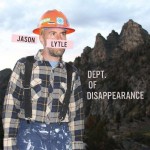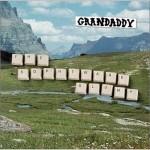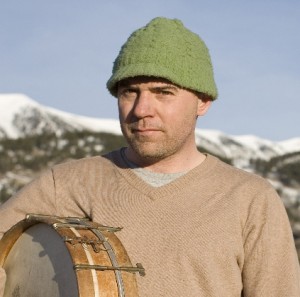The Grandaddy album Sophtware Slump masterfully explored the relationship between technology and alienation, and it is only fitting that it came out in the year of Y2K. This album, one of the best of the 2000’s decade in my humble opinion, was the work of Jason Lytle, a sonic architect who creates lush, vintage synthesizer-driven futuristic pop music.
Grandaddy released three other stellar studio albums and various EPs in addition to Sophtware Slump, and broke up in the mid-2000’s, although they recently reunited for a short tour. Lytle (the first syllable is pronounced “light” not “lit”) went on to release the Grandaddy-esque solo album Yours Truly, The Commuter in 2009, and just released his second solo album called Dept. of Disappearance.
The following interview was for a preview article for Lytle’s concert at SOhO in Santa Barbara, California on 10/21/12. It was done by phone on 10/10/12. (Jeff Hawe photo)
Jeff Moehlis: What can we look forward to at your upcoming show in Santa Barbara?
Jason Lytle: God, you know, I’m still at the point… I’ve got to be truthful with you here, I usually have a lot of concerns and worries and anxiety before I start a little tour like this, because I’m not always sure what the hell I’m going to do. There’s always a degree of winging it once I get onstage, which can be exciting, but it’s a little nerveracking because I’m sort of one of those people that like to know what my plan is and not have too many loose ends. I don’t know why I do this to myself. I’m going into it halfway planned, and I will definitely be winging the rest of it.
The tour itself, I’m really looking forward to. It’s a good length for me. I like them short like that. And I don’t get the chance to hit that neck of the woods in California that often, so that’s cool.
JM: Will there be a band with you, or is it going to be you solo?
JL: Well, I don’t have a band, but I have a good friend of mine who I’ve had play with me a number of times for stuff like this. He’s actually flying into town today, we’re rehearsing three or four days, and we’re going to work something out to where the scaled-down renditions of the songs are still pretty interesting, and there’s just enough weird stuff going on. Still comprehensive versions of the songs, but in no way at all attempting to fully emulate the way albums sound.

JM: Speaking of albums, your new album is just about to come out. Can you tell me a little bit about that album?
JL: You know, after Grandaddy I took a little time off, and then I came out with my first solo record [Yours Truly, The Commuter], and that went well. A few years after staying busy with various projects I finally finished this new one. I don’t know, it’s a lot bigger. I mean, it’s so much more involved soundwise, and has these epic moments where I really had to not worry about ever attempting to tackle any of the songs live [laughs]. Because, I don’t really ever want to have a band again, and I really love recording and being in the studio. So it’s more of a guilty pleasure listen. Yeah.
JM: How has your approach to songwriting, recording, and production evolved over the years?
JL: Gosh. I really feel like I’m still just kind of doing the same thing. It all stems from just trying to create these goosebump-type moments, you know. I remember listening to music when I was a kid, eight years old, and just being so blown away by sound and songs and production, all at once. And wanting to do that myself at some point.
I think it wasn’t until my early twenties when I really said, OK, I’m going to figure out how to do this. I’m going to try to figure out how to do this. So the quest started then, and that’s all I’m doing. I’ve just continued to sort of recapture that moment that I had, getting really excited about music when I was around eight years old. Aside from some technological advancements, and getting a little bit better at playing instruments, I think I’m still doing the same thing really.
JM: Do you have any musical training, like instruments you played as a kid?
JL: No, I don’t. I don’t read music. I just kind of latched on. I think I was lucky enough, either somebody that I knew or somebody… There always seemed to be a guitar. I had older brothers and sisters, so there may have been some instruments laying around. But I think more than anything I was also influenced by their record collections. And oddly enough, when my dad remarried, my step-mom had worked at a radio station, and the radio station had just closed down so all the DJ’s kind of raided the place. So when my dad married her, we also inherited this huge record collection that I benefited from immensely.
JM: I get the impression that your writing and recording sort of go hand in hand. Do you have an an idea of what a song is going to sound like beforehand, or is there a lot of trial and error involved?
JL: I mean, it really helps if I get a pretty vivid snapshot. The process is still really mysterious to me. But I’d say eight times out of ten, I’m working on a piece of music that I’m pretty excited about. I still love the whole idea of a song beginning and meandering and going on this journey, and reaching this point and then rounding itself out. If I find a piece of music that I’ve been working on that I’m super excited about, then I really put a lot of pressure on myself at that point to attach the most fitting words that I can find. And then at that point, you end up stumbling upon something that can be magical, that’s something that you couldn’t have predicted in the beginning. All of this is a goal, and these are just attempts that I make. Sometimes I come close to hitting that target, but not as much as I’d like to.
JM: I know that you just finished a reunion tour with Grandaddy. How did that go?
JL: It was fine. It was a lot of fun. In the beginning I had no idea if I was doing the right thing by saying OK to it. But once we got to rehearsing, it was like no time went by as far as our relationships with each other. It was a real joy hanging out with the guys, and we played some great shows and actually came home with some money. Novel concept after all those years. But yeah, I did get a glimpse again of why I got out of all that. I’m kind of happy to be back home. There’s just the whole group traveling thing, and the neverending-ness of it is not really my thing. It was just long enough, but not too long.
JM: So it sounds like you don’t have any plans to go out on another Grandaddy tour any time soon?
JL: Yeah, not any time soon, to tell you the truth. I got my fill for a while.

JM: Speaking of Grandaddy, one of my favorite albums from the 2000’s is Sophtware Slump. What are your reflections on that particular album?
JL: It’s tough for me to say, because I’m so involved. Everything from dreaming up the ideas to tracking everything to writing everything, and then getting everything mastered and then promoting the thing, and then going on tour. That was pretty much the crux, that was when we were really firing on all cylinders. So, I don’t know, it’s a wealth of memories for me. But it was still really scrappy, and we were still just kind of flying by the seat of our pants.
You know, I think with all my albums, it’d be nice to think that I was a little bit more confident, and that I wasn’t so self-conscious about these things that I was making. But I didn’t know. I had no idea that people were going to attach themselves to it to the degree that they did. So that part was kind of a thrill later on. But I have a weird perspective of it because it was a lot of work, and it was still surrounded by a lot of uncertainties. I’m definitely pretty flattered that it ended up making some sort of mark in indie rock, or pop, or whatever.
JM: What advice would you give to an aspiring musician?
JL: [long pause] Make sure that you love it. Make sure that the love for the music and the creativity is driving everything else. And then if you pass that test, then you’ve got to think really long and hard if that love exists enough to get you through all of the tough times that are going to come if you actually decide to try to do that for a living. And, I don’t know, if you work really hard then there’s a good chance that stuff will fall into place. I think if you don’t go into it with some pretty noble reasons to begin with, then you’re going to be kind of screwed in the long run.
JM: I know that the album is about to come out, you have this short tour planned. What are your plans, musical or otherwise, beyond those things?
JL: Hmm… Sometime around the time that I was finishing this record I realized that I had all of these versions of the songs that are on the album, kind of floating around, that were just as solid but completely different from the album versions. So I’m actually planning, when the whole promotion cycle and a little bit of time goes by, I plan on recording and releasing the same exact album, but the songs are done in entirely different, usually more intimate, and maybe slightly scaled-down and even weirder versions. I’m thinking about calling it Dept. of Reappearance. All of this is totally in the speculative stages.
JM: Do you want to set the record straight on anything about your career, Grandaddy, etc?
JL: I don’t know. I guess if you have never heard of us, then it doesn’t matter whether I set the record straight at all. And if you’ve heard of us, I guess I should just be thankful for that. I tend to find that some people have just flat out never heard of us. They’ve either totally never heard of Grandaddy or myself, or they have. There doesn’t seem to be a lot of gray area. In this day and age, you’ve just got to take what you can get.
JM: Where are you speaking to me from?
JL: I am in Montana, USA, and it’s a beautiful day outside. I plan on, other than rehearsing, spending as much of it outdoors as possible.
JM: Was the new album recorded in Montana?
JL: Yeah, I’ve got a studio connected to my house here. That’s where I tracked pretty much every single note.


Discussion
No comments for “Interview: Jason Lytle”